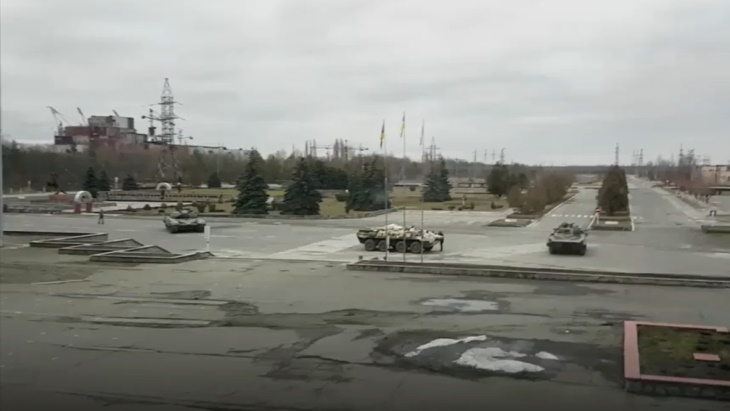Ukrainian regulator restores Chernobyl licences
17 August 2022
The State Nuclear Regulatory Inspectorate of Ukraine (SNRIU) decision resumes most of the plant's radioactive waste management licences, which were suspended in May following the Russian military occupation of the area.
 Tanks were seen at Chernobyl in this video from the EBRD
Tanks were seen at Chernobyl in this video from the EBRD
SNRIU's Licensing Commission 10 August decision restores SSE Chernobyl NPP's (SSE ChNPP) licences for decommissioning work at units 1, 2 and 3 of the Chernobyl nuclear power plant, operation of the confinement complex and the Shelter facility, and the processing and storage of radioactive waste. It also restores the Central Enterprise for the Management of Radioactive Waste's licences for the construction and operation of storage facilities for the disposal of radioactive waste at the Vektor complex, the operation of radioactive waste storage facilities in the exclusion zone, and processing and storage of radioactive waste.
SNRIU suspended the licences in May after considering the impact of damage in the exclusion zone resulting from the military occupation, a move ChNPP said had effectively paralysed operations at the site. The regulator's decision to renew the licences comes after the conclusion of expert assessments by the State Atomic Energy Regulatory Commission, with the involvement of the National Nuclear Research and Development Center of Ukraine and with support from a European Commission cooperation project.
The assessment looked at documentation supplied by the licensees to show that the reasons for SNRIU's suspension of the licences have now been "eliminated", the regulator said. These include: restoration of operational efficiency of a number of systems important for the safety of objects and activities; inventory of radioactive materials, radioactive waste, and sources of ionising radiation; control of availability and compliance of reporting and accounting documentation and databases; solving logistical issues of personnel and equipment delivery; restoration of emergency preparedness; and control of the absence of explosive devices within objects and sites.
These assessments concluded that the specialised enterprises are able to conduct activities within the framework of licences in compliance with the requirements of regulatory documents and license conditions, the regulator said.
Almost all of ChNPP's subdivisions were involved in the licence renewal activities, which required a "huge" scope of work, the company said. As well as preparing a large number of substantiating documents and information, the work included a property inventory and a radiation survey of the facilities, premises and territory of the ChNPP industrial site.
SNRIU has asked ChNPP to implement a number of additional measures to improve the safety level of facilities, according to the recommendations of the expert assessment, Igor Khomyak, head of ChNPP's Licensing Department, said.
Most of the licences resumed on 15 August, with the final licence - for the use of ionising radiation sources - resuming on 17 August.
Chernobyl was occupied by Russian forces from 24 February until the end of March, when they withdrew. The European Bank for Reconstruction and Development subsequently calculated that damage caused to buildings, equipment and infrastructure will cost at least EUR100 million (USD102 million) to repair.
Researched and written by World Nuclear News